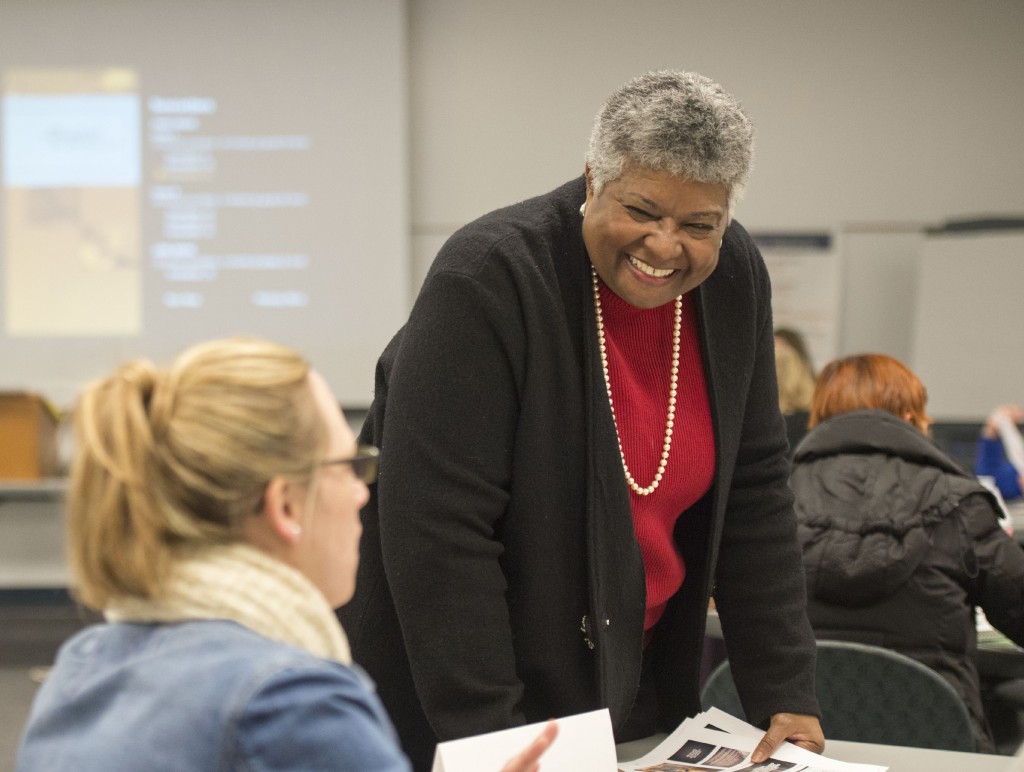
Alfreda Brown’s mother cried when Alfreda was chosen to integrate East Side Junior High School in Little Rock, Ark., in 1961.
“She knew how I would be treated and that she could not protect me from that,” recalled Brown, a consultant with the Office of Human Resources at Washington University in St. Louis.
Brown’s mom was right. No, Brown would not need a military escort like her cousin Thelma Moorehouse, one of the “Little Rock Nine,” who integrated Little Rock Central High School in 1957. But she would be bullied, ridiculed, dismissed.
“We were there and not there,” said Brown of her fellow nine black classmates. “We were allowed to be part of the classroom but, for example, when they taught square dancing in gym class, all of the black students had to sit in the bleachers. They didn’t want us mixing.”
Despite her mother’s misgivings, Brown chose East Side because she wanted the same resources and opportunities as white kids. Hard-working and high-achieving, Brown believed she deserved them. So she was shocked when her guidance counselor told her she would fail at East Side.
“It was the first time I heard an adult doubt my ability,” said Brown. “Up until that point, my parents always pushed us to succeed. I was just a pre-teen at that time, but I knew you should never say anything to another person that will limit their view of what’s possible. You never can tell.”
In the decades since, Brown has had many jobs and titles but only one goal – to help others realize those possibilities. As the longtime director of the Career Center, she helped students discover employment paths that matched their passions. And today, she helps university staff members build their careers.
“I’ve always believed that you need to have a good understanding of an individual’s gifts and talents,” Brown said. “Then you can empower them with the right opportunities and resources.”
Empress Sanders is among the staff members who have realized their potential with Brown’s guidance. After 10 years at the university, Sanders decided to attend one of Brown’s career workshops. She expected to get networking tips; what she got was a new life.
“She asked us to map our lives from high school to the present. And then she asked a question I will never forget: ’How would your life be different if fear had not been a factor?’” recalled Sanders. “That question kicked me in the gut. I realized that I was afraid I wasn’t good enough.”
Sanders earned her degree in psychology from University College in Arts & Sciences, took a leadership role with the Diversity and Inclusion Forum for Faculty and Staff (DIFFS) and was selected to serve as a delegate for the Day of Discovery. Sanders also helped form the recently convened Danforth Staff Council. She did not, however, leave her job as student coordinator and adviser in the Department of Germanic Languages and Literatures in Arts & Sciences.
“I like my work, but I wanted to find innovative ways to ramp up my role in the department and the university,” Sanders said. “It’s about blooming where you are planted. For employees who have felt this is all there is — take it or leave it — Alfreda has restored hope.”
Still, Brown recognizes the challenges staff face, especially African-American employees. She helped coordinate the administration of the 2015 Diversity Engagement Survey on the Danforth Campus, which found that black employees feel less valued and supported than their white counterparts.
“One of my greatest disappointments, after reviewing the survey results, is to read statements by young professionals of color that express the same level of dissatisfaction that black employees felt in the 1970s when many of us were looked over for advancements,” Brown said.
To provide more opportunities for all staffers, she helped develop the You Behind WashU networking series, where staff members meet campus decision-makers. A collaborative effort with DIFFS, the Career Center and the Office of Human Resources, the next You Behind WashU event is at noon Feb. 11 in the Danforth University Center, Room 276 with University Librarian Jeffrey Trzeciak.
“We have people working on our campus who accepted a position at WashU just to have a job,” Brown said. “Since they have been here, many have taken advantage of our tuition benefits, they’ve grown professionally, they’ve mastered their position they are in and are capable of doing something different.
“The You Behind WashU series is designed to help our staff know where the opportunities are on campus and, more importantly, know what the decision-makers value in the people they hire.”
Brown will retire this summer and plans to return to Little Rock. She will travel, spend time with her family and volunteer at the nonprofit organization Heifer International, which has headquarters in Little Rock.
“I don’t know what’s next for me,” Brown said. “You never can tell, but I do have great expectations for some wonderful new adventures.”